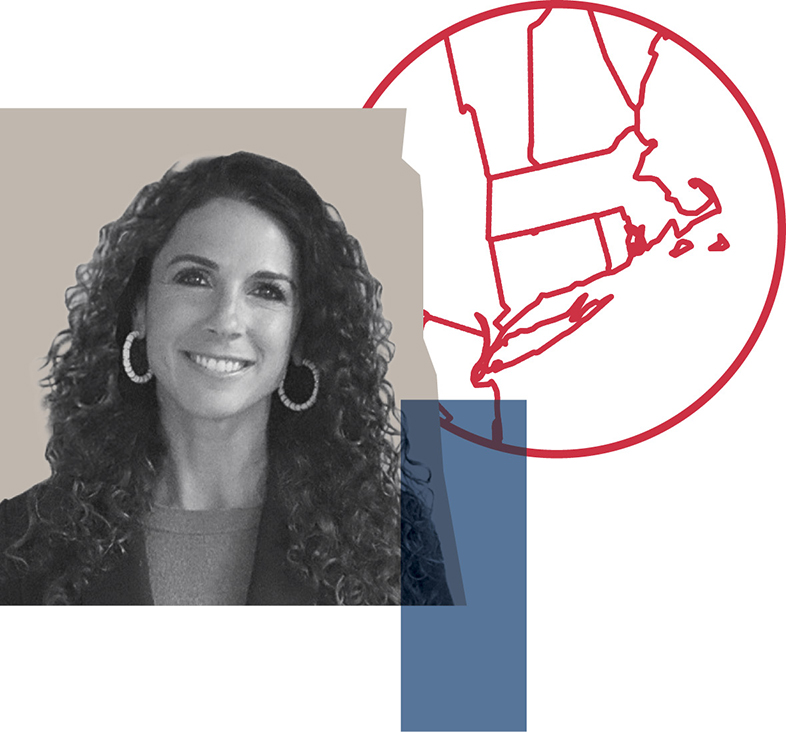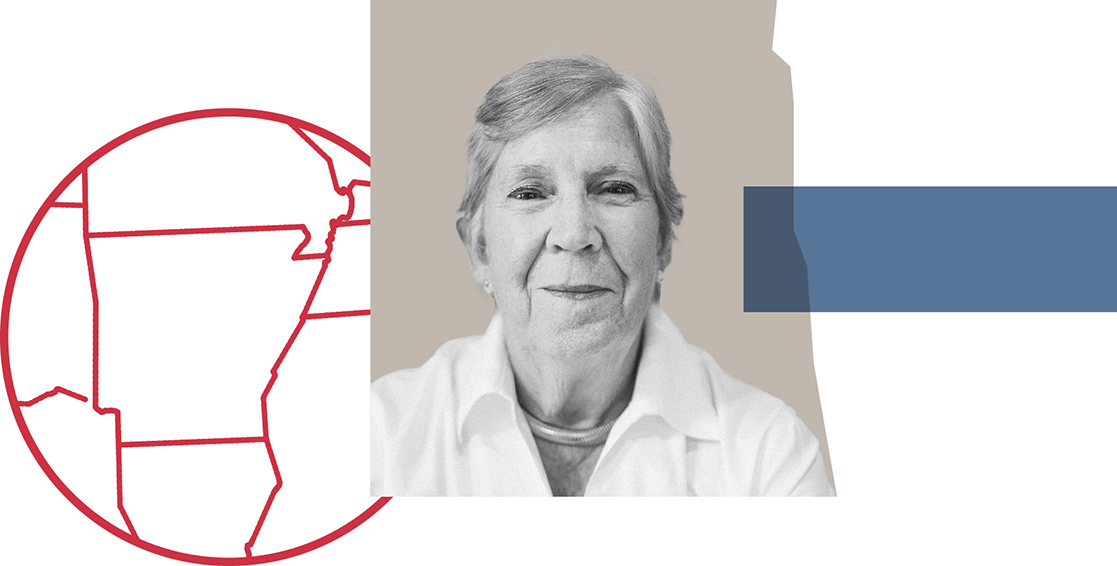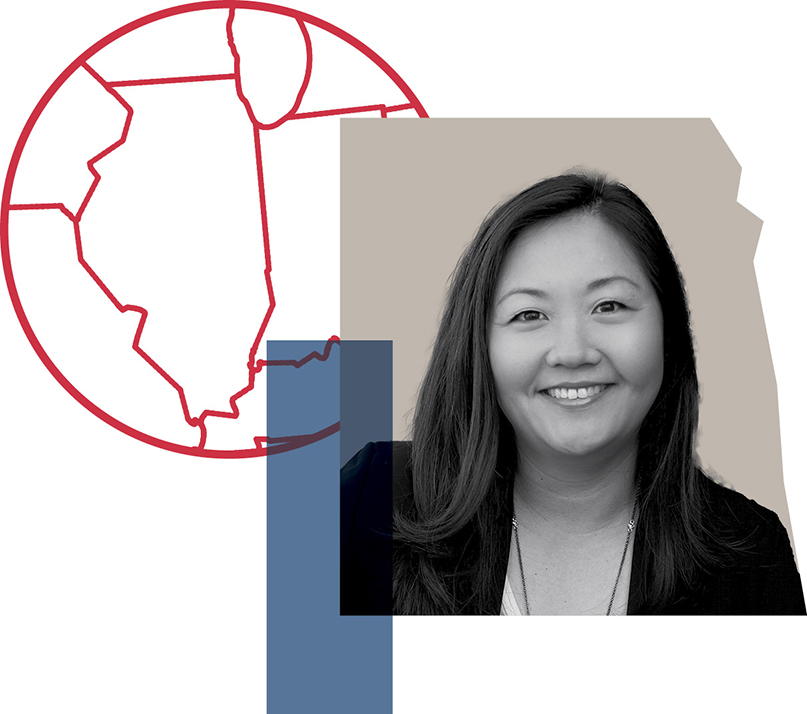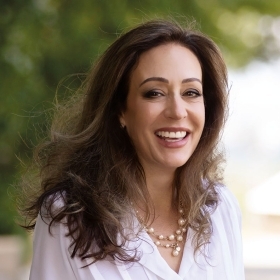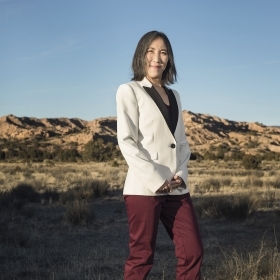During a historic midterm election cycle, many Wellesley alums ran for office, driven by their desire to make change in their communities.
During a historic midterm election cycle, many Wellesley alums ran for office, driven by their desire to make change in their communities.

The results of the midterms were a surprise, depending on whom you ask. Heading into Election Day last November, some polls put President Joe Biden’s approval rating in the 30s, which did not bode well for the Democrats, and conservative pundits predicted a “red wave” in the midterms. A “red wave” that never came.
“I was surprised not so much because of the chatter around this specific election, but if you look at historical trends, it is [a] very typical outcome that the party in the White House loses the midterms that follow that election,” says Jennifer Chudy, Knafel Assistant Professor of Social Sciences and assistant professor of political science at Wellesley.
Chudy’s research focuses on how white Americans’ views on race influence their politics. Since the 1960s, politics have become increasingly partisan, with the most recent survey data on the electorate showing that “partisanship is more divisive than it’s ever been,” Chudy says.
“And then complementing that, over the last few years, we’ve seen that these partisan identities have become really fused with race, so that there are now very few people of color in the Republican Party and then a lot more in the Democratic Party,” Chudy says.
With a more racially diverse Democratic Party open to conversations on race, “I think there was a lot of concern that the Democrats were turning off their base,” she says. “But a lot of these concerns were expressed without an understanding of how the composition of the Democratic Party may have shifted since the Obama years.”
Emily Amick ’07, former counsel to Sen. Chuck Schumer, D-N.Y., and a self-described “political influencer” with over 100,000 followers on Instagram (as “Emily in Your Phone,” @emilyinyourphone), didn’t have those concerns. “I’ll say, I’m not a 55-year-old white man who has regular punditry spots on TV. … I am talking to a community of people who are not regularly represented by the punditry we see in media,” says Amick, who works full-time as an attorney representing victims of state-sponsored terrorism.
“There was no red wave. And I wasn’t surprised, because I have been hearing from women day in, day out for months about how frustrated they are with the lack of policy solutions offered by the Republican Party,” she says.
Not only were women making their voices heard in voting booths, their names were also on ballots. In a historic moment for Massachusetts, women were elected to five out of six of the state’s constitutional offices, including Diana DiZoglio CE/DS ’11 as state auditor. In another political first, Bronwyn Lance ’90 was named chief of staff for Rep. Chuck Edwards, R-N.C., and is the first woman to hold the position in the district (see “Leading on Capitol Hill”). In the weeks after the midterm elections, Wellesley spoke with five alumnae candidates, from coast to coast and in between, about their experiences in politics so far.
Diana DiZoglio CE/DS ’11
Massachusetts State Auditor; Democratic Party
Elected
What motivated you to enter politics?
I’d honestly never imagined running for public office. I’d been working in youth and community centers doing outreach, providing counseling and mentorship in underserved communities. After that, I got a job working at the [Massachusetts] State House and was able to continue doing that important work. I fell in love with the work and, through [that] role, learned of the great things that can be done for the community through public service. I saw areas of state government that worked well and others that needed improvement to ensure all families had equitable access to succeed. And so I decided to run for state representative myself, have taken that work with me to the Senate, and will continue that public service as auditor.
How did Wellesley influence your political life?
My time at Wellesley left an immeasurable, positive impact. I have to admit, when I first arrived at Wellesley, I had imposter syndrome. My classmates weren’t just from around the corner, but from all over the world. I thought I was perhaps in over my head—but time would prove me wrong. I met many amazing women at Wellesley, some of whom would become invaluable mentors, encouraging me to pursue my dreams and providing great support.
Why state auditor?
I was born to a 17-year-old single mom and grew up housing insecure but waitressed and cleaned houses to pay my way through college, also earning scholarships. I know what it’s like to have to be scrappy to make ends meet and understand that every wasted dollar is another child’s future opportunities at risk. It’s another family who goes without housing or health care. I’ll work to promote transparency and accountability so the tax dollars we work hard for are working hard for us.
Emily Randall ’08
Washington State Senate, District 26 (Bremerton); Democratic Party
Elected
How did you win what local news outlets called “one of the costliest and hardest fought races of the year”?
After first winning election in 2018 in the tightest, toughest, most expensive legislative race of that cycle statewide … I (perhaps naively) thought my reelection four years later would be a little easier. But once again, my 2022 race broke records. … I won my reelection the same way I won in 2018: outworking the other guy and connecting more meaningfully with my neighbors.
What were your most significant accomplishments in your first term?
As the older sibling to a younger sister born with complex disabilities, I learned from a young age what access to health care meant for families like mine. … I passed policies to extend postpartum Medicaid coverage from three months to a full year for qualifying birth parents and to establish Washington’s Universal Health Care Commission. … But what sticks with me the most are my bills to require anti-racism training in our state’s medical schools, as well as continuing education requirements for licensed providers. [The bills] were inspired by Rana Zoe Mungin ’11, a first-year in Claflin when I was house president, who was taken too soon by COVID-19 and a health care system riddled with bias.
What did it mean to you to be the first Latina elected to represent your district?
In addition to being the first Latina to represent my district, I’m the first queer woman elected to the Senate and the youngest current member. And as a first-gen college graduate (thanks to Wellesley’s generous financial aid!) I was elected by my colleagues to serve as chair of the Senate’s Higher Education & Workforce Development Committee less than one year into my first term—a role that allows me to open doorways to Washington students who’ve never thought college was an option.
Celina Reynes ’16
San Leandro City Council (Calif.), District 1; Democratic Party
Elected
What was it like to run for office (and win) in your hometown?
Running for city council as a third-generation San Leandro resident has been extremely rewarding. I live in the house my grandparents bought when they immigrated to San Leandro [from Portugal], and every day I walk roughly the same route my grandmother would take to her factory job (the site of which is now a train station). I love having a personal relationship to the town, and now that I am pregnant with my first child, I am even more committed to improving the city for the next generation of residents.
Was it hard to wait two weeks for your win to be certified via ranked-choice voting?
To be honest, I was more anxious in the month or so leading up to Election Day than I was during the period where we were waiting for results. … That isn’t to say that the waiting period was easy. … Luckily, I was surrounded by people who are a lot more experienced … in interpreting the results and the trends. By the third or fourth update, we were feeling really confident. My family and close friends (particularly my husband, Teddy) were also a huge comfort during that time.
Did Wellesley play a role in your campaign?
To my knowledge, I’m the youngest person to be elected to my city council and the first openly LGBTQ+ woman to hold this position. I faced a lot of scrutiny on the campaign trail as a young woman—and a decent amount of online harassment because of my sexual orientation, despite living in the “progressive” Bay Area. I’m grateful that Wellesley taught me to be secure in who I am and in my capabilities and to be fearless in my advocacy.
Rebecca “Becky” Vaughan Ward ’69
Arkansas State Senate, District 27 (Fort Smith); Democratic Party
Defeated
What challenges did you face running as a Democrat in a historically red district?
The biggest challenge in running for office in the deep red district I am in is that many voters just check the “R” column without even thinking about the actual candidates. … I got 36% of the vote … and that was better than [many] of the Democratic candidates running statewide. The second challenge was voter turnout. Arkansas is 49th in the country in terms of voter turnout. If we could get our turnout upped by 50%, we would begin to have a shot at turning things purple at least. But, so far, we don’t seem to have been able to move that needle.
How was it running a campaign alongside your husband, who was also running for office?
It was my first time running. I ran because no one else was going to do it. … You can’t win if you don’t play. Having both of us running was a major plus. We were both neophytes, so it was good to have both of us trying to figure out problems and dealing with the demands. (When we were first married, we were the “Bobbsey Twins go to business school,” so this time we were the “Bobbsey Twins run for office”!)
What is your biggest takeaway from the campaign?
That politics is a skill, like anything else, and it takes time and effort to learn how to do it. I would run a different, and hopefully more effective, campaign with the experience I had. … Going forward, I am going to work to reach out to the Asian and Hispanic communities and get former Democratic voters reactivated. I don’t think I will run again, but if no one else steps up …
Yeena Yoon Yoo ’01
DuPage County Board, District 2 (Elmhurst, Ill.); Democratic Party
Elected
What do you hope to achieve in office?
First … I’m very excited to use my board position to connect residents to critical and available resources and address issues of food insecurity, affordable housing, and mental health services at the county level. Second, as a woman of color and the first Asian woman to run and win in my district, I’m looking forward to pursuing ways we can celebrate diversity, advance equity, and serve disenfranchised residents who are disconnected from county events and programs. Last, but not least, I ran as a gun safety candidate. I will consider it my greatest accomplishment if I can pass common-sense, public health policies to reduce gun violence … in our community. Until changes can be made at the federal level, I believe that state and local leaders need to step into the gap to save lives.
How did you get into politics?
I was sickened by daily gun violence both locally and nationwide. My husband innocently suggested we buy bulletproof backpacks for our young sons, which incensed me. It occurred to me that this was no way to live; this was no future I wanted for my children. … Basically, I got tired of hearing the word “no,” so I threw myself into the political ring. … Here’s the short answer: I got involved in politics because of guns.
You are also a legal aid attorney. What do you find most fulfilling about that work?
For over 10 years, I specialized in family law and domestic violence litigation to help clients escape their abusers and start new lives. I experienced real satisfaction each time I won a custody case, secured child support or maintenance/alimony, or obtained an order of protection against an abuser. … The best part of my job as a legal aid attorney is empowering clients and providing people with tools to level the playing field.
[substory:1]
Emily Bader ’18 is a Portland, Maine-based journalist.
